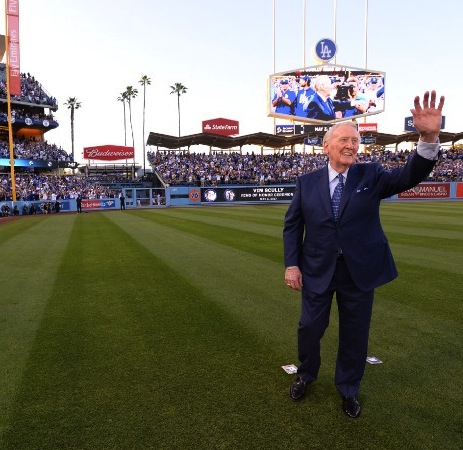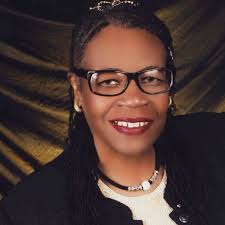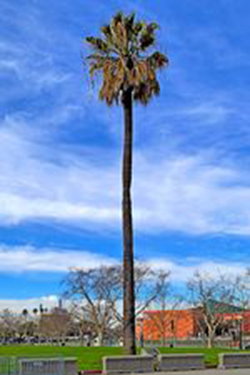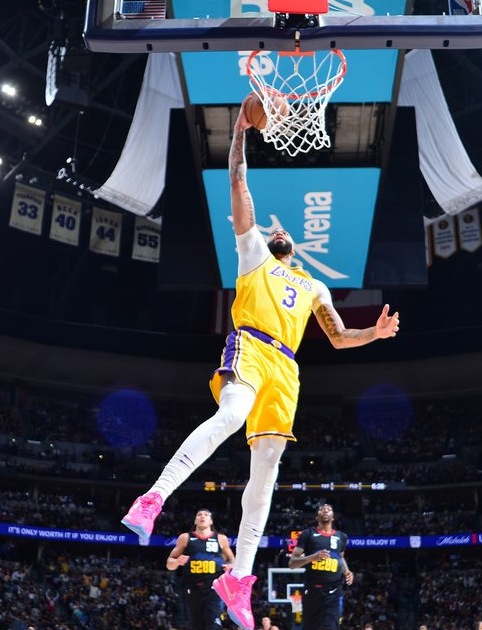Wave Wire Services
LOS ANGELES — Vin Scully, the voice of the Dodgers from the time they moved to Los Angeles, and who started his career as the team’s broadcaster in Brooklyn, is being remembered by players, fans, baseball executives and city dignitaries for his stories and his love of baseball.
Scully died at his home in Hidden Hills Aug. 2 at the age of 94.
The Dodgers announced his death shortly after 8 p.m. in a statement issued during the middle of the Dodgers game with the Giants in San Francisco. The Dodgers defeated the Giants, 9-5.
“We have lost an icon,” said Dodger President and CEO Stan Kasten. “Vin Scully was one of the greatest voices in all of sports. He was a giant of a man, not only as a broadcaster, but as a humanitarian. He loved people. He loved life. He loved baseball and the Dodgers. And he loved his family.
“His voice will always be heard and etched in all of our minds forever. I know he was looking forward to joining the love of his life, Sandi. Our thoughts and prayers go out to his family during this very difficult time. Vin will be truly missed.”
Scully broadcast Dodger games from 1950 — when the team was based in Brooklyn — through his retirement in 2016 at age 88. His 67-year tenure as a Dodger broadcaster is the longest for a broadcaster with a team.
Scully was born in the New York City borough of the Bronx on Nov. 29, 1927, and grew up in the Washington Heights section of Manhattan. When he was 8 years old, he was assigned to write a composition on what he wanted to be when he grew up.
“Where the boys in grammar school wanted to be policemen and firemen and the girls wanted to be ballet dancers and nurses, here’s this kid saying, ‘I want to be a sports announcer,’” Scully once said. “I mean it was really out of the blue.”
Fans paid their respect to Scully making a memorial outside Dodger Stadium in Elysian Park in front of the sign that bears his name. They left flowers, candles and shared memories of the moments in Dodger history Scully delivered on the radio and TV.
As a youth, Scully helped his family financially by delivering beer and mail, pushing garment racks, and cleaning silver in the basement of the Pennsylvania Hotel.
Scully attended Fordham University in the Bronx, where he announced football, basketball, and baseball games on the university’s radio station, WFUV, wrote a sports column for The Ram student newspaper, was a stringer for the New York Times, and was a member of the Shaving Mugs, a campus barbershop quartet.
Scully was also an outfielder on the school’s baseball team and played in a 1947 game against Yale, whose first baseman was future President George H.W. Bush. Both were hitless in three at-bats in Yale’s 3-1 victory.
Scully graduated from Fordham in 1949, then sent about 150 letters to radio stations along the Eastern seaboard. He only received one response, from WTOP, the CBS station in Washington, D.C., which made him a fill-in.
That fall, he returned to New York and was asked by Red Barber, the broadcaster and sports director of the CBS Radio Network to fill in for an ill broadcaster to call the Boston University-University of Maryland college football game.
Scully was relegated to an outdoor press box at Fenway Park in the freezing cold, but performed his duties without complaint, which impressed Barber, who was also the Dodgers’ lead announcer. Months later, when the Dodgers were looking for a third broadcaster to join Barber and Connie Desmond, Scully was hired at the age of 22.
Scully’s first regular-season game with the Dodgers was on April 18, 1950, when they faced the Phillies at Philadelphia’s Shibe Park.
“Don Newcombe was going to be our pitcher,” Scully said at a 2016 news conference the day before he broadcast his final game at Dodger Stadium. “Red Barber assigned me to do the fourth inning. They didn’t trust me more than one inning. I understand that.
“My first game, Newcombe didn’t make it to the fourth inning. That’s all I really remember, plus the fact I was terrified.”
In 1953, when he was 25 years old, Scully became the youngest person to broadcast a World Series. He became the Dodgers’ No. 1 broadcaster in 1954 after Barber left to become a New York Yankees’ broadcaster.
Either on the team or NBC broadcasts, Scully called such memorable moments by the Dodgers (or their opponents) as Kirk Gibson’s pinch-hit home run in the bottom of the ninth inning of Game 1 of the 1988 World Series, Sandy Koufax’s perfect game in 1965, New York Yankee pitcher Don Larsen’s perfect game against the Dodgers in the 1956 World Series and Hank Aaron’s record-setting 715th home run.
Scully’s many honors include the Presidential Medal of Freedom, the Ford C. Frick Award, presented annually by the Baseball Hall of Fame to a broadcaster for “major contributions to baseball” and being named the greatest sportscaster by the American Sportscasters Association.
A ranking system devised by author Curt Smith for his 2005 book “Voices of the Game” determined that Scully was baseball’s greatest announcer, giving him a perfect score of 100, based on such factors as longevity, language, popularity and persona.
In addition to his work for the Dodgers, Scully broadcast football and golf for CBS from 1975 through 1982. The final football game he broadcast was the NFC championship game on Jan. 10, 1982, when Dwight Clark caught a 6-yard touchdown pass from Joe Montana in the final minute to give the San Francisco 49ers a 28-27 victory over the Dallas Cowboys to give them their first Super Bowl berth.
Scully moved to NBC in 1983, and was the play-by-play announcer on baseball’s “Game of the Week.”
Scully also hosted the game show, “It Takes Two” on NBC from 1969-70 and “The Vin Scully Show,” a weekday afternoon talk-variety show on CBS in 1973.
Scully broadcast his final game at Dodger Stadium on Sept. 25, 2016.
“I am terribly embarrassed,” Scully told the crowd following the Dodgers’ 4-3 victory 10-inning over the Colorado Rockies on Charlie Culberson’s home run that assured them of their fourth consecutive National League West Division championship.
Scully broadcast his final game on Oct. 2, 2016. He said he chose it to be his final game, instead of broadcasting the team’s postseason games, because it came 80 years to the day from when he saw a sign in his native New York City showing the score of Game 2 of the 1936 World Series, an incident that made him a baseball fan.
“It seems like the plan was laid out for me, and all I had to do was follow the instructions,” Scully said.
Los Angeles City Hall was lit in blue the night of Aug. 3 to honor Scully’s legacy, “celebrate his contributions, and memorialize the man who could bring a city together with five magic words, ‘It’s time for Dodger baseball,’” Mayor Eric Garcetti said.
“Vin Scully was bigger than baseball,” he added. “He was the soul of Los Angeles, the undisputed voice of America’s pastime, and the narrator of some of the most thrilling moments of our lives. It is impossible to think about the Dodgers without reflecting on Vin’s incomparable way with words and the boundless wisdom he shared with generations of fans around the world.
“Our hearts are broken by his passing, but he will forever be remembered as an indispensable teller of L.A.’s story and the author of some of our most indelible memories.”
Dodger pitcher Clayton Kershaw called Scully, “the best there ever was.”
“Just when you think about the Dodgers, there’s a lot of history here and a lot of people who have come through, it’s just a storied franchise all the way around, but it almost starts with Vin, honestly,” Kershaw told SportsNet LA, the regional cable sports network that carries nearly all of the Dodgers’ games.
At his farewell news conference in 2016, Scully said he would like to be remembered as “a good, honest man, a good husband, a good father, a good grandfather. I’m not even thinking about sports announcing.”
Scully is survived by five children, Kevin, Todd, Erin, Kelly and Catherine, 21 grandchildren and six great-grandchildren. His second wife Sandi died in 2021. His first wife Joan died in 1972.












